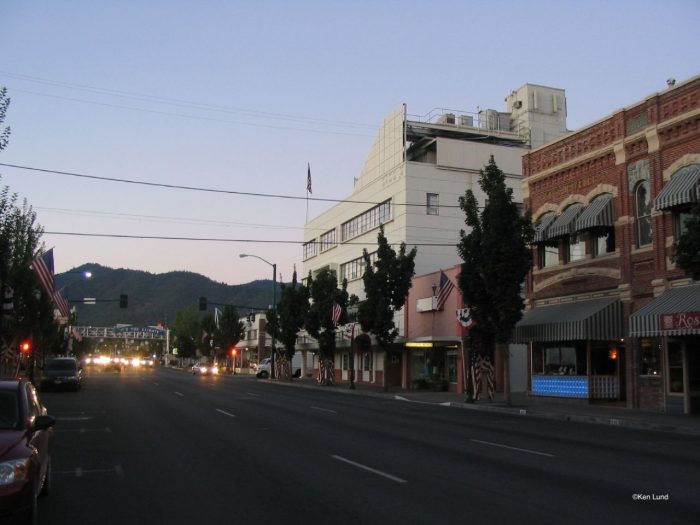Court frees cities to deal with their homelessness crises
By Steven Greenhut | August 16, 2024
SACRAMENTO – During a recent trip to Grants Pass, Ore., I took a photo of the city’s iconic downtown sign stating, “It’s the Climate” and then posted it on social media as I often do with travel photos. Given the terminally online culture where everything is presumed to be political, some followers figured the city was making an environmental statement. Whenever one hears the word “climate” these days it usually is followed by the word “change.”

In reality, city leaders erected the cool lighted sign in 1920 to draw tourists to the quaint now-39,000-population city in the scenic Rogue Valley – 85 miles inland from the closest beach town. Southern Oregon has a Mediterranean climate that gets far less rain than other parts of western Oregon. For example, it gets 55 inches less annual rainfall than my favorite Oregon burg, Astoria.
Aside from its spectacular scenery and, yes, pleasant weather, Grants Pass has gained a reputation for something less attractive: homelessness. AP reported the city’s once-lovely parks are “sites of encampments blighted by illegal drug use and crime, including a shooting at a park last year that left one person dead. Tents cluster along riverbanks, next to tennis courts and jungle gyms….”
Like many Western cities, Grants Pass lost any flexibility in handling the situation after the notoriously liberal federal 9th Circuit Court of Appeals issued its Martin v. Boise ruling in 2018. In that case affecting the Western region, the court declared that local efforts to enforce anti-camping ordinances amounted to a violation of the Eighth Amendment’s ban on cruel and unusual punishment.
“In the early years of the republic, the phrase ‘cruel and unusual punishment’ was interpreted as prohibiting torture and particularly barbarous punishments,” according to the American Bar Assocation. But the 9th Circuit justices took a more expansive definition: “(J)ust as the state may not criminalize the state of being ‘homeless in public places,’ the state may not ‘criminalize conduct that is an unavoidable consequence of being homeless – namely sitting, lying or sleeping on the streets.’”
Watch the Pacific Research Institute’s webinar about the Grants Pass decision featuring Theane Evangelis, who argued the case before the U.S. Supreme Court.
Read PRI’s amicus brief in
Grants Pass v. Johnson.
The city of Grants Pass didn’t criminalize the status of homelessness, nor did it subject homeless people to floggings, outrageous fines and other indignities. Instead, the city imposed modest fines on people who camp on public property. Short jail time only applied to repeat offenders. The city didn’t criminalize homeless people based on their status. It applied the statute to anyone camping in city parks.
Per Martin v. Boise, cities could remove the homeless from public property provided they had somewhere to move them. Grants Pass had only one homeless shelter (which was, ironically, not even operating at full capacity). In essence, the court used its power to engage in policy making: forcing cities and counties to build more homeless shelters so they have some place to move the unhoused population.
It is a good idea to build such shelters, but in our democratic system it’s inappropriate for the courts to twist the meaning of the Constitution as a pretext for imposing a legislative solution on local governments. Grants Pass then became the epicenter of legal battles over homelessness after it lost a lawsuit filed by a nonprofit representing the city’s homeless population. The U.S. Supreme Court took up the case after the city lost an appeal at the 9th Circuit.
And, as most readers know, the U.S. Supreme Court agreed with the city in its Grants Pass v. Johnson decision in June – a ruling that applies nationwide. The opinion, penned by Justice Neil Gorsuch, declared that, “Such punishments do not qualify as cruel because they are not designed to [inflict] ‘terror, pain or disgrace.’ Nor are they unusual, because similarly limited fines and jail terms have been and remain among ‘the usual mode[s]’ for punishing criminal offenses throughout the country.”
“[P]eople will disagree over which policy responses are best; they may experiment with one set of approaches only to find later another set works better; they may find certain responses more appropriate for some communities than others,” Gorsuch added. “But in our democracy, that is their right. Nor can a handful of federal judges begin to ‘match’ the collective wisdom the American people possess in deciding ‘how best to handle’ a pressing social question.”
Three liberal justices dissented, but many liberal policy makers were relieved. Gov. Gavin Newsom filed an amicus brief complaining that Martin v. Boise “left few and fragmented options for local governments.” Newsom recently issued an executive order directing agencies to begin clearing away encampments on state-owned land. Following the decision, San Francisco Mayor London Breed “launch[ed] aggressive homeless sweeps,” per one newspaper headline.
Oregon codified portions of Martin v. Boise, so it’s unclear how that state will deal with the problem, although lawmakers are free now to try innovative policies. Some will be good, others bad (see California’s failed experiment with “Housing First”), but at least the People no longer have their hands tied. I’m hoping the next time I visit Grants Pass I’ll find an even better climate, at least with regard to public order.
Steven Greenhut is director of the Free Cities Center. This piece was first published in The Orange County Register and is reprinted with permission.
